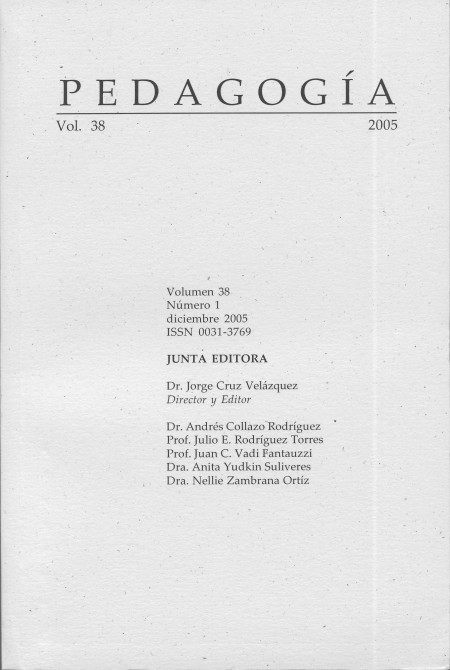Résumé
Cómo citar:
Álvarez, H. J. (2005). La integración curricular: Un análisis crítico de los modelos propuestos. Pedagogía, 38(1), 152-167.
Références
Ackerman, D. & Perkins, D.N. (1989). lntegrated Thinking and Leaning Skills Across The Curriculum. En H. H. Jacobs (Ed.), lnterdisciplinary Curriculum: Design and Implementation. Alexandria, Virginia: ASCO.
Álvarez, H. J. (2004). La capacitación en las nuevas teorías sobre el aprendizaje. San Juan, Puerto Rico: Ediciones Santillana lnc.
Beane, J. A. (1997). Curriculum Integration: Designing the Core Of Democratic Education. Teachers College, Columbia University.
Chambers, J. H. (1983). The Achievement of Education: An Examination of Key Concepts In Educational Practice. New York: University Press of America.
Coll, C., Pozo, J., Sarabia, B. & Yalis, E. (1992). Los contenidos en la Reforma: Enseñanza y Aprendizaje de Conceptos. Procedimientos y Actitudes. España: Santillana.
Eklund, B. J. (1991). Education 2000 lntegrated Curriculum. Phi Delta Kappan, Vol. 72(10): 793- 797.
Ellis, A. K. & Fouts, J. T. (1993). Research on Educational Innovations. USA: Eye on Education, Inc.
Erickson, H. L. (2002). Concept-Based Curriculum and Instruction. California: Corwin Press, lnc.
Fogarty, R. (1991). Ten Ways to Integrate Curriculum. Educational Leadership, Vol. 49(2): 61 - 65.
Fogarty, R. & Store, J. (1995). lntegrating Curricula and Multiple Intelligencies: Teams, Themes and Threads. IRI Skylight Pub. lnc.
Frawley, W. (1997). Vigotsky y la Ciencia Cognitiva. Barcelona, España: Paidos.
Furth, H. G. (1981). Piaget and Knowledge. Chicago, USA: University of Chicago Press.
Gazzaniga, M. S., lvry, R. B. & Mangun, G. R. (2002). Cognitive Neuroscience: The Biology of Mind (2da. ed.). New York: W. W. Norton & Company.
Goldman, A. I. (1986). Epistemology and Cognition. Cambridge, Mass: Harvard University Press.
Gould, S. J. (2003). The Hedgehog, the Fax, and the Magister s Pox: Mending the gap between science and the humanities. New York: Harmony Books.
Hirst, P. (1974). Knowledge and Curriculum. London: Routledge.
Hirst, P. (1965). Liberal Education and the Nature of Knowledge. En Archambault, R. O. (Ed.) Philosophical Analysis and Education. London: Routledge and Kegan Paul.
Jacobs, H. H. (1989a). lnterdisciplinary Concept Model. En H. H. Jacobs (Ed.), lnterdisciplinary Curriculum: Design and Implemenlation. Alexandria, Virginia: ASCO.
Jacobs, H. H. (1989b). The Growing Need For lnterdisciplinary Curriculum Content. En H. H. Jacobs (Ed.) lnterdisciplinary Currículum: Design and Implementation. Alexandria, Virginia: ASCO.
Kosslyn, S. M. (1999). lmage and Brain: The Resolution of the Imagery Debate. Cambridge, Mass: M IT Press.
Keil, F. C. (1989). Concepts, Kinds, and Cognitive Development. Cambridge, Mass: MIT Press.
Keil, F. C. & Wilson, R. A. (2002). Explaining Explanation. En Keil, F C. y Wilson, R. A. (Eds.), Explanation and Cognition. Cambridge, Mass: MIT Press.
Kellough, R. O. y otros. (1996). lntegrating Mathematics and Science far Kindergarten and Primary Children. New Jersey: Merrill, Prentice Hall.
Kovalik, S. & Olsen, K. (1994). ITI: The Model: lntegrated Thematic Instruction (3ra. Eed.). Washington: Books for Educators, Inc.
Kovalik, S. J. & Mcgeehan, J. R. (1999). Integrated Thematic lnstruction: From Brain Research to Application. En C. M. Reiggeluth (Ed.), lnstruclional Design Theories and Models. London: Lawrence Erlbaum Assoc. Pub.
Kuhn, T. S. (1996). The Structure of Scientific Revolutions (3ra. ed.). Chicago: The University of Chicago Press.
Mandler, J. M. (2004). The Foundations of Mind: Origin of Conceptual Thought. New York, NY: Oxford University Press.
Maute, J. (1989). Cross-Curricular Connections. Middle School Journal, Vol.20(4): 20 - 22.
Murphy, G. L. (2000). Explanatory Concepts. En Keil, F. C. y Wilson, R. A. (Eds.), Explanation and Cognition. Cambridge, Mass.: MIT Press.
National Research Council. (2002). How People Learn: Brain, Mind, Experience, and School. Washington, O. C.: National Academy Press.
Norton, R. E., Mary J. Kisner y otros. (1997). Integrate Academic and Vocational Curriculum. American Ass. Vocational lnstructional Material (AAVIM).
Pérez Echevarria M. del P. & Pozo Municio, J. I. (1994). A prender a resolver problemas y resolver problemas para aprender. En Pozo Municio, J. I. (Ed) la solución de problemas. Madrid, España: Aula XXI, Santillana.
Perkins, D. N. (1989). Selecting Fertile Themes for Integrated Learning. En Jacobs, H. H. (Ed). lnterdisciplinary Curriculum: Design and Implementation. Alexandria, Virginia: ASCO.
Piaget, J. (1976). The grasp of consciousness: Action and concept in the young child. Cambridge, Mass.: Harvard University Press.
Piaget, J. & Inhelder, B. (1968). The Psychology of the Child. Dunsmore, P.A.: Basic Books.
Popper, K. R. (2002). Conjectures and Refutations: The Growth of Scientific Knowledge. New York: Routledge Classics.
Pozo, J. I. & Gómez, M. A. (1994). La solución de problemas en ciencias de la naturaleza. En: Pozo, I. y otros (Eds.), La solución de problemas. España: Aula XXI, Santillana.
Pozo, J. I. (2003). Adquisición de conocimiento: Cuando la carne se hace verbo. Madrid, España: Ediciones Morata.
Rodrigo, M. J. & Correa, N. (2002). Teorías implícitas, modelos mentales y cambio educativo. En Pozo, J. I. y Monereo, C. (Eds.) El aprendizaje estratégico. Madrid, España: Aula XXI Santillana.
Roberts, P. L. & Kellough, R. D. (2004). Interdisciplinary Thematic Unit (ITU) Columbus, Ohio: Pearson, Merrill Prentice Hall.
Shoemaker B. J. E. (1991). Education 2000: lntegrated Curriculum. Phi Delta Kappan, Vol. 72(10): 793 - 797.
Silver, H. F., Strong, R. W, & Perini, M. J. (2002). So Each May learn: Integrating learning Styles and Multiple Intelligences. Alexandria, Virginia: ASCO.
Vigotsky, L. (1999). Thought and language. Kozulin, A. (Ed) Cambridge, Mass.: The MIT Press.
Villarini, A. R. Y otros. (1988). La enseñanza orientada al desarrollo pensamiento. San Juan, PR.: Departamento de Instrucción Pública.

Ce travail est disponible sous licence Creative Commons Attribution - Pas d’Utilisation Commerciale 4.0 International.

